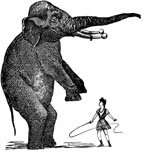
Man as Redeemer of Beast
CREATION FELL & CREATION SHALL BE REDEEMED
To redeem in theology is to rescue and deliver from the bondage of sin and the penalties of God’s violated law. That creation is fallen and shall be redeemed — reconciled — is clear in Romans 8:21-22 and Colossians 1:20. But what can innocent animals in the wild know of sin and God’s law as revealed by the Saviour of Man? Beasts know only the law of the pack or the herd — to kill or to avoid being killed. And yet as part of creation, they are somehow to be redeemed.
What is the relation of Man to Nature? At first glance, a plundering and destructive relation: the sacred grove turned into a parking lot, the steers slaughtered to make hamburgers, the wild beasts hunted for food or sport, fish in the millions netted or hooked. If indeed Man has been given dominion over Beast, then everything he does is either lawful authority or abuse of authority. But I do not say that all I listed in the relationship is always and everywhere wrongful abuse. To replace the sacred grove, Man plants millions of trees and irrigates deserts. The slaughtered young steers if not destined for steaks would have no life at all, never having been born. Many hunters love and replenish the running deer or the crafty fox as the fisherman loves the gleaming trout, and both in their sport may receive intimations of Him who created the trees and birds and grass, even as I did in this momentary glance:
You May Also Enjoy
Are American Catholics dense? That seemed, at first blush, to be the underlying message delivered by Peter Kodwo Appiah Cardinal Turkson.
To live in the truth, we must want the truth. That means doing what we can to get at the reality hidden behind the empty slogans of partisan ideology.
The divorce rate for couples in mixed marriages spikes in the second five years of marriage, especially with the advent of children.

